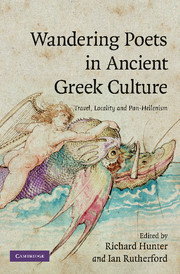Book contents
- Frontmatter
- Contents
- List of figures
- Notes on contributors
- Acknowledgements
- List of abbreviations
- 1 Introduction
- 2 Hittite and Greek perspectives on travelling poets, texts and festivals
- 3 Thamyris the Thracian: the archetypal wandering poet?
- 4 Read on arrival
- 5 Wandering poets, archaic style
- 6 Defining local identities in Greek lyric poetry
- 7 Wandering poetry, ‘travelling’ music: Timotheus' muse and some case-studies of shifting cultural identities
- 8 Epigrammatic contests, poeti vaganti and local history
- 9 World travellers: the associations of Artists of Dionysus
- 10 Aristodama and the Aetolians: an itinerant poetess and her agenda
- 11 Travelling memories in the Hellenistic world
- Bibliography
- Index
8 - Epigrammatic contests, poeti vaganti and local history
Published online by Cambridge University Press: 04 July 2009
- Frontmatter
- Contents
- List of figures
- Notes on contributors
- Acknowledgements
- List of abbreviations
- 1 Introduction
- 2 Hittite and Greek perspectives on travelling poets, texts and festivals
- 3 Thamyris the Thracian: the archetypal wandering poet?
- 4 Read on arrival
- 5 Wandering poets, archaic style
- 6 Defining local identities in Greek lyric poetry
- 7 Wandering poetry, ‘travelling’ music: Timotheus' muse and some case-studies of shifting cultural identities
- 8 Epigrammatic contests, poeti vaganti and local history
- 9 World travellers: the associations of Artists of Dionysus
- 10 Aristodama and the Aetolians: an itinerant poetess and her agenda
- 11 Travelling memories in the Hellenistic world
- Bibliography
- Index
Summary
This paper addresses the role of wandering poets as local historians. There will be two principal limitations to my enquiry: first, the enquiry will be restricted to the period up to the end of the Hellenistic epoch, and secondly, I will examine only the activity of wandering poets as authors of poems written for public monuments. The first section discusses the fact that composing public epigrams, i.e. epigrams set up in public spaces by groups, political institutions, ruling élites or the polis as a whole, was in a number of cases a task fulfilled by wandering poets. The second section is concerned with the procedure through which texts for public monuments were chosen, and it will be proposed that the procedure was occasionally agonistic. A closer look at the contexts of such epigrammatic competitions suggests that they took place in (a) the framework of public festivals, and (b) the framework of public commissions.
In the third section I will demonstrate that poems composed by wandering poets for local public monuments, even though they may reflect the patron's view or version of historical events, still had an impact which surpassed the boundaries of the polis, local group or political élite that sponsored them. Therefore, I will argue for a supra-local reception of poetry composed for local addressees.
- Type
- Chapter
- Information
- Wandering Poets in Ancient Greek CultureTravel, Locality and Pan-Hellenism, pp. 195 - 216Publisher: Cambridge University PressPrint publication year: 2009
- 5
- Cited by



